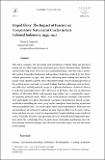Files in this item
Staged glory : the impact of fascism on 'cooperative' nationalist circles in late colonial Indonesia, 1935-1942
Item metadata
| dc.contributor.author | Lengkeek, Yannick | |
| dc.date.accessioned | 2018-10-26T08:30:06Z | |
| dc.date.available | 2018-10-26T08:30:06Z | |
| dc.date.issued | 2018 | |
| dc.identifier | 256317196 | |
| dc.identifier | e13bd5d5-af84-4d07-b663-67f4ac960ad7 | |
| dc.identifier | 85048402753 | |
| dc.identifier.citation | Lengkeek , Y 2018 , ' Staged glory : the impact of fascism on 'cooperative' nationalist circles in late colonial Indonesia, 1935-1942 ' , Fascism: Journal of Comparative Fascist Studies , vol. 7 , no. 1 , pp. 109-131 . https://doi.org/10.1163/22116257-00701003 | en |
| dc.identifier.issn | 2211-6249 | |
| dc.identifier.uri | https://hdl.handle.net/10023/16330 | |
| dc.description.abstract | This article examines the circulation and articulation of fascist ideas and practices among the so-called cooperating nationalist party Partai Indonesia Raya (Parindra) and its youth wing Surya Wirawan in late colonial Indonesia. After the radical nationalist parties demanding Indonesian independence had been crushed by the Dutch colonial government in 1934, only parties refraining from making such radical demands could operate in public. Since their frustratingly weak bargaining position in the political arena was hard to conceal, leading Parindra politicians such as Soetomo (1888–1938) evoked powerful images of a ‘glorious Indonesia’ (Indonesia Moelia) to keep the nationalist project alive. The ideas of Soetomo, who was an expressed admirer of Mussolini, Hitler, and Japanese imperialism, had a considerable impact on Parindra’s political course. Others, such as the journalist Soedarjo Tjokrosisworo were particularly vocal about their fascist sympathies. Tjokrosisworo played an influential role in modelling the ‘scout group’ on the example of fascist fighting squads and other paramilitary units. The article argues that Parindra’s philofascist demeanor was an integral part of a strategy to achieve an aura of power. However, the party’s dynamism and glory was just ‘staged’ to compensate for Parindra’s lacking scope of political action. Generally, the party’s incorporation of fascist elements raises important questions about the relationship between anticolonial nationalism and fascism since the latter entered Indonesia during a time when the nationalist project was still very much in the making. | |
| dc.format.extent | 23 | |
| dc.format.extent | 613894 | |
| dc.language.iso | eng | |
| dc.relation.ispartof | Fascism: Journal of Comparative Fascist Studies | en |
| dc.rights | Copyright © Lengkeek, 2018. This is an open access article distributed under the terms of the prevailing CC BY-NC License at the time of publication. | en |
| dc.subject | Fascism | en |
| dc.subject | Anticolonial nationalism | en |
| dc.subject | Indonesia | en |
| dc.subject | Decolonization | en |
| dc.subject | Scouting | en |
| dc.subject | Modernity | en |
| dc.subject | DS Asia | en |
| dc.subject | T-NDAS | en |
| dc.subject.lcc | DS | en |
| dc.title | Staged glory : the impact of fascism on 'cooperative' nationalist circles in late colonial Indonesia, 1935-1942 | en |
| dc.type | Journal article | en |
| dc.contributor.institution | University of St Andrews.School of History | en |
| dc.identifier.doi | 10.1163/22116257-00701003 | |
| dc.description.status | Peer reviewed | en |
This item appears in the following Collection(s)
Items in the St Andrews Research Repository are protected by copyright, with all rights reserved, unless otherwise indicated.

